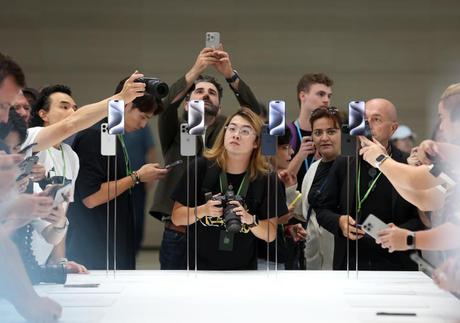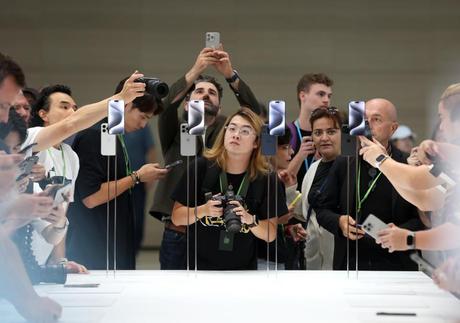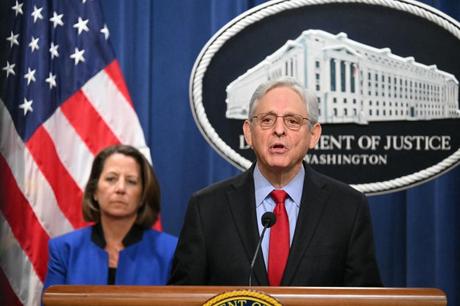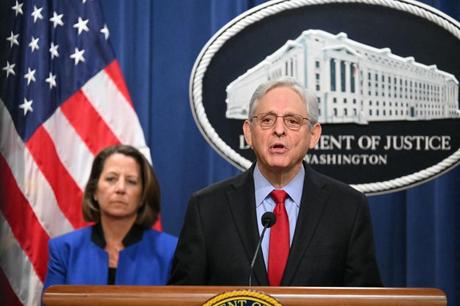According to the US government, Apple is like a disease, spreading and destroying any competition that stands in its way. The problem has infected much of the world - and even damaged Apple's core, making the iPhone even worse.
The tech giant's anticompetitive behavior "reverberates across industries ... including financial services, fitness, gaming, social media, news media, entertainment and more," a new lawsuit reads.
"Unless Apple's anti-competitive and exclusionary behavior is stopped, the company is likely to expand and entrench its iPhone monopoly into other markets and parts of the economy."
That was one of many accusations made by the US Department of Justice last week when it formally charged Apple with illegally using its monopoly to maintain its own position in the smartphone market.
More was to follow, when the European Union announced a few days later that it would be investigating Apple, Meta and Google over claims of failure to properly comply with the new Digital Markets Act (DMA).
Apple is now facing strict scrutiny on both sides of the Atlantic. The company, which was once a scrappy newcomer and often still seems to see itself that way, has grown into one of the largest companies in the world. Lately, it seems that governments have started to see this as a danger - as something that could harm the experience of their citizens.
The proceedings in both Europe and the US are based on a fairly simple premise: that Apple's control over its platforms allows the company to crush competition and therefore harm consumers, and that its power should be limited through regulation.
For example, the US case suggests that Apple can use its control over the iPhone and its platform to favor the Apple Watch, meaning other potentially better smartwatches can't gain access to the same features. While that's one of many complaints, they're all largely versions of the same problem: Features and benefits are hidden from customers so Apple can maintain its power and money.
The story continues


Apple sees the different rules as a threat - or at least wants people to think so. In her statement following the American proceedings, she suggested that she could be forced to make fundamental changes.
"This lawsuit threatens who we are and the principles that differentiate Apple products in fiercely competitive markets," the report said. "If this succeeds, it would hinder our ability to create the kind of technology people expect from Apple - at the intersection of hardware, software and services. It would also set a dangerous precedent, giving the government the power to take a heavy hand in designing people's technology."
Apple is right to say that the consequences of the procedure could be dramatic. The DMA, for example, gives officials rare leeway to impose meaningful fines: Companies can be forced to pay up to 10 percent of their annual revenue. The US lawsuit is less specific - it only asks for "assistance" that would stop Apple from behaving illegally - but it could still lead to dramatic penalties.
But it's also unusual that the company has responded publicly to these regulations. For example, the DMA's approach appears to have been to offer some form of compliance, try it out and then adjust as necessary. During hearings related to the EU case recently, Apple told a concerned developer that some of the legislation sounded potentially troubling and that they should be on the lookout for a response.
The proceedings in both Europe and the US are based on a fairly simple premise: that Apple's control over its platforms allows the company to crush competition and therefore harm consumers
Similarly, Apple appeared to fool the Justice Department when it changed its rules for gaming streaming services - one of the central tenets of the complaint - just a few weeks before the action was announced.
That is one of the problems with attempts to control companies through the courts. The EU's action has been followed for years and is accompanied by a thorough set of rules and penalties for non-compliance.
It also requires Apple to let its users download apps from other third-party app stores. Apple complained about the changes for years and may have only complied with them in the most resistant way, but it did accept the need to do so.
The US government, likely due to political issues that make passing new laws difficult, has chosen to use existing laws in an attempt to crack down on Apple. In fact, the action against Apple is based on an astonishingly old law - the Sherman Anti-trust Act of 1890, which is closer to the US's inception than it is today. It was intended to limit the power of the growing trusts that were taking over tobacco, steel, oil and other major industries, and was signed at a time when the biggest problem was railways, not broadband connections.


Still, it has remained useful for lawmakers trying to rein in companies. Its basic principles-that while a monopoly is permissible, using that monopoly status to control the market is not-have been applied to technology companies that could never have been contemplated by John Sherman, the senator who wrote the law.
For example, it was used in 2001, when the US sued Microsoft, alleging that it had illegally monopolized the browser market with its Windows product. The government had initially tried to break up the company, but eventually settled and agreed to limited new rules for Microsoft and Windows, some of which were later struck down on appeal.
At the time, the case was hailed as a major development in the rules surrounding personal computing - although Microsoft continued to dominate the market, and it was not the government but the mobile revolution that partially dethroned it.
The Apple case is perhaps today's version: not aimed at PCs in people's homes, but at the phones in their pockets. It is being delivered by a new generation of government lawyers, in relation to a new generation of technology, but the principles they are trying to uphold are largely the same.
The conclusion could also be largely the same: big statements on both sides, and a potentially seismic change in the technological landscape, followed by a quiet compromise that changes little.
